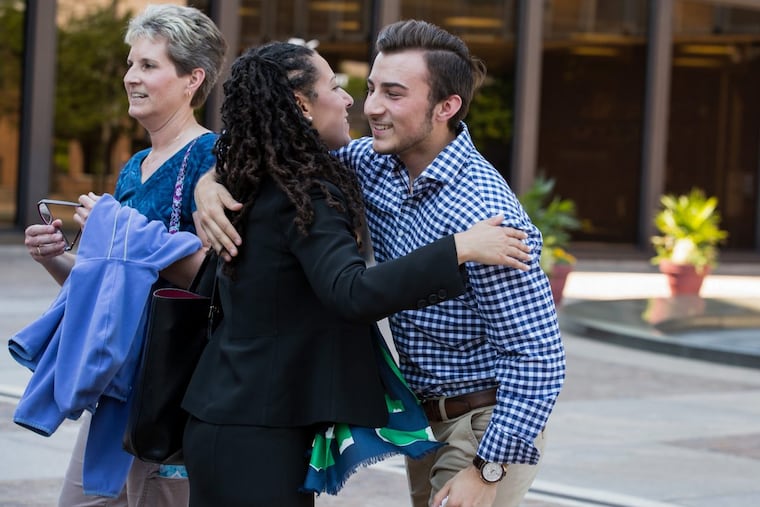Supreme Court rejects appeal over Boyertown schools’ transgender restroom policy
The decision on Tuesday affirmed an earlier ruling by the U.S. Court of Appeals for the Third Circuit, which in an unusual move last year issued its decision upholding the policy less than 20 minutes after the hearing at which they heard complaints from the protesting students.

The U.S. Supreme Court declined Tuesday to consider a challenge to the Boyertown Area School District’s policy allowing transgender students to use restrooms and locker rooms that correspond to their gender identity.
In so doing, the justices rejected the latest appeal from a conservative legal organization representing six students who say they felt uncomfortable after spotting transgender teens using the restrooms of their choice.
The decision, issued in a one-line order, lets stand a lower-court ruling that has shaped a growing body of law surrounding the question of whether federal statutes protect against discrimination based on gender identity. It also effectively ends a legal fight that has roiled the Berks County school district since 2017.
That issue has become more fraught in recent years with President Donald Trump’s decision to roll back Obama-era protections soon after he took office.
Ria Tabacco Mar, a senior staff lawyer with the American Civil Liberties Union, hailed the Supreme Court’s decision.
“This is an enormous victory for transgender students across the country,” said Mar, who intervened in the case on behalf of the Pennsylvania Youth Congress, a coalition of LGBTQ youth leaders. “Boyertown’s schools chose to be inclusive and welcoming of transgender students. … This lawsuit sought to reverse that hard-won progress.”
Meanwhile, Christiana Holcomb, legal counsel for the Alliance Defending Freedom, the Christian advocacy law firm that represented the suing students, vowed that her firm’s fight on the issue would continue — even if the Boyertown case was over.
“We hope the Supreme Court will eventually weigh in to protect students’ constitutional right to bodily privacy,” she said. “All schools, including [Boyertown], should be providing compassionate support for those dealing with gender dysphoria, but they should do it in a way that protects the privacy of all students.”
The Supreme Court’s decision on Tuesday leaves standing an earlier ruling by a three-judge panel of the U.S. Court of Appeals for the Third Circuit, which in an unusual move last year issued its decision upholding the policy less than 20 minutes after hearing the arguments of the protesting students.
Circuit Judge Theodore McKee said at the time that the students had failed to show that they were irreparably harmed by the school district’s policy — especially given the steps the Boyertown district had taken to accommodate those who did not feel comfortable sharing facilities with transgender teens.
The district implemented its transgender restroom policy in 2016 under Obama-era guidelines that required all federally funded school districts to recognize basic transgender student rights and chose to stick with them after Trump eliminated those standards soon after taking office.
To accommodate anyone who was uncomfortable, district officials expanded the number of single-user restrooms, alternative locker rooms, and private stalls across their high school’s campus so that any student could use them, instead, if they preferred.
Aidan DeStefano, a recent Boyertown graduate and transgender male, described that policy as crucial to his emotional well-being during his high school experience.
“By the time I graduated, I was using the boys’ bathroom and participating on the boys’ cross-country team,” he said Tuesday. “I felt like I belonged and had the confidence I needed to continue with my education.”
The six students who filed suit in 2017 argued that the policy effectively forced them into using the alternate facilities — a move they described as a form of discrimination. They argued that the only solution was to overturn the policy and return to the status quo — a suggestion that seemed to hold little sway with the Third Circuit’s judges last May.
“You could have come in here during Brown v. Board of Education and said, ‘Let’s go back to the status quo,'” McKee told the students’ lawyers, referring to the landmark Supreme Court decision that struck down racial segregation policies in public schools. “These types of cases wouldn’t happen if the answer was always, ‘Go back to the status quo.’”